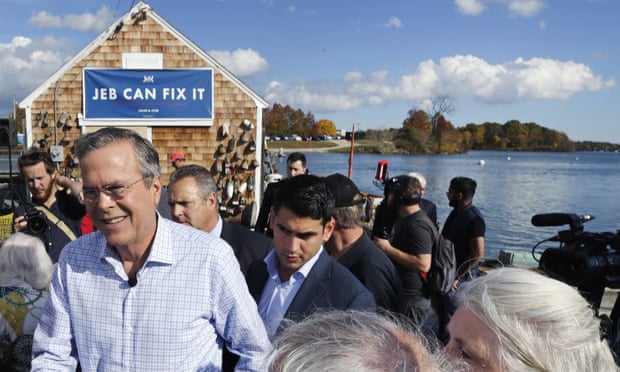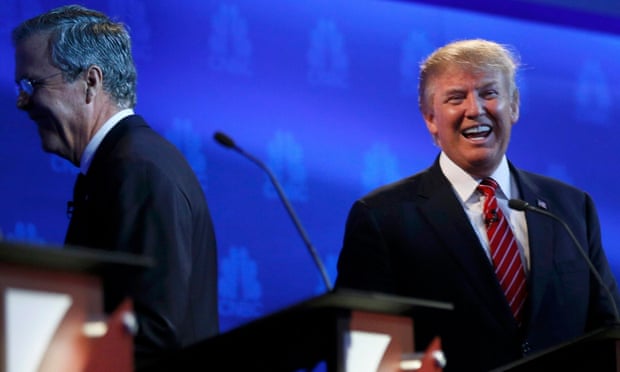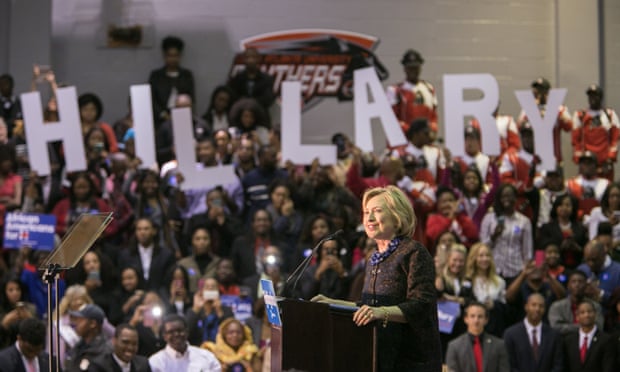Jeb Bush’s arrival at a waterside sandwich shop in Portsmouth on Thursday was supposed to mark the beginning of his family’s return to the White House. Puffy clouds dotted a brilliant blue sky, the trees burned red, yellow and orange, and water lapped softly in the background. Hoisted behind the platform where Bush would speak was a large sign that said: “Jeb can fix it.”
But after an unsteady performance in Wednesday’s Republican debate, Bush found himself defending how he planned to fix not the nation but his floundering campaign, which just a few months ago had roared to life with a promise of “shock and awe”, through its combination of fundraising prowess and family fortune.
“How do you think you did in the debate?” a reporter shouted as Bush pushed his way through the scrum of cameras and smartphones. His face steeled. “I did great.”
Speaking to voters outside the sandwich shop, Bush appeared cowed – confounded by a primary race led by a jeering billionaire and a subdued former neurosurgeon.
“I wish I could talk as well as some of the people on the stage, the big personalities on the stage,” the party’s former frontrunner lamented. “But I’m a doer.”
After the event, Bush was again encircled by journalists and photographers, at the edge of the parking lot where he spoke. One step back and he would have been in the water.
He denied that his run for the White House was “on life support”.
“We have the most money,” he said about his campaign, which used his family’s network to amass a record-setting $103m in the first half of 2015. “We have the greatest organization. We’re doing fine.”
Last week – before the debate – Bush announced cuts to that organization, in the name of saving that money.
This week, a two-hour drive away in Littleton, New Hampshire, Bush’s would-be challenger, Democratic frontrunner Hillary Clinton was holding an economic roundtable at a high school.
A young man in the audience asked how she intended to end corruption when she and her husband, former president Bill Clinton, have been dogged by scandals from Whitewater to Benghazi and her use of a private email server. Some in the crowd gasped. Clinton rose to respond.
“I wish you’d go back and read the history of the 1990s,” she replied, “because clearly there were unfortunately a lot of partisans who thought that the best way to work with my husband’s administration was through attacks of all kinds, all of which washed out … And I advise you to go back and read my 11 hours of testimony [to the House Select Committee on Benghazi last week]. I hope you enjoy it.”
The audience burst into applause.
In the past few weeks, as Bush has seen his presidential ambitions slip, Clinton has watched her own rise – buoyed by a strong debate showing, a poised performance during the congressional hearing on Benghazi and vice-president Joe Biden’s decision not to enter the race. Clinton is on track, Bush is off it. A dynastic battle for the White House has never seemed less likely.
‘The odds were always against him’
After falling far behind Donald Trump and Ben Carson, Bush was forced narrow his focus on the early voting states of Iowa and New Hampshire.
But in calls to more than 70,000 primary voters in Iowa, Bush’s campaign identified only 1,200 who said they would support him, according to a memo shown to Bush’s major donors in Houston this week and acquired in full by US News and World Report.
Analysts say Bush’s presidential bid is suffering from problems including a lack of enthusiasm, poor debate showings, a crowded Republican field of 13 other candidates … and his last name.
“The odds were always against him,” said William G Mayer, professor of political science at Northeastern University. “Even when he was the establishment ‘frontrunner’, he wasn’t much of a frontrunner.”
Mayer said Bush was both hurt and helped by his family name. Among fundraisers it has proved invaluable but among voters, especially Republicans who blame his brother George W Bush for tarnishing the party’s brand, it is still toxic, Mayer said.
Bush’s supporters have been left wondering why their candidate, a two-term governor of Florida, has lagged behind contenders with no experience in government.
“If you cleared the stage a bit and voters were left with a choice between Ben Carson, Donald Trump and Jeb Bush, then who would they pick?” said Susan Shasteen, a resident of Florida who attended Bush’s event in New Hampshire while vacationing in the area.
Her husband, Randy, dismissed Wednesday’s debate as a make-or-break momentfor Bush. “It’s too early to give up yet,” he said. “Not a single person has voted yet.”
Indeed, in the age of Super Pacs and wealthy donors, Bush’s campaign seems too big to fail.
“He’s not on life support because the thing that sustains your life is money and he has plenty of that and he has the establishment backing,” said Ernest McGowen, assistant professor of political science at the University of Richmond. “There’s just no reason why he would get out at this stage.”
‘We have an understanding of what works’
In stark contrast with Bush’s poor performance in the first three Republican debates, Clinton strengthened her standing in the primary race after she took the stage with the other Democratic contenders on 13 October. Until that point, Clinton’s campaign had struggled to shed the perception that it lacked momentum even though the former secretary of state maintained a firm grasp on the top spot in national polls.
“I’m not running for my husband’s third term. I’m not running for President Obama’s third term. I’m running for my first term,” Clinton told late-night talk show host Stephen Colbert this week. “But I’m going to do what works, and we have an understanding of what works.”
While Bush is competing against more than a dozen Republicans, Clinton’s field-clearing presence has left the path to the Democratic nomination almost entirely wide open. This summer, Vermont senator Bernie Sanders began to gain traction with his brash style and criticism of what he calls “grotesque” levels of income inequality. But his campaign is still chasing Clinton’s lead.
“I’ve been annoyed that she’s the anointed one,” said Mary Krempels, an undecided voter in Portsmouth, New Hampshire, who was interested in Sanders’ message. “When I look at her, I don’t see what she’s offering except that she’s the first woman, which I think would be great, but she’s not the woman I want.”
Krempels said she was still looking for a candidate to support and had come to Bush’s event to hear what he had to say.
“I don’t know the reason, exactly, but he hasn’t shined,” Krempels said, admitting that she liked his father, George HW Bush, but not his brother, George W. “I thought seeing him in person he may, but I didn’t get that feeling.”
At a campaign stop later that evening, Nora Barré, a Bush supporter who drew media attention when she asked him at a previous town hall what he would do about the Syrian war that had forced some of her relatives there to flee, showed unabated confidence in the outcome of the Republican primary.
“People are going to wake up, especially in New Hampshire. They’ll wake up and they’ll realize who the good candidate is, which is, of course, George Bush,” Barré said, before immediately correcting herself with an embarrassed laugh.
“Jeb Bush. Jeb Bush.”



0 comments:
Post a Comment